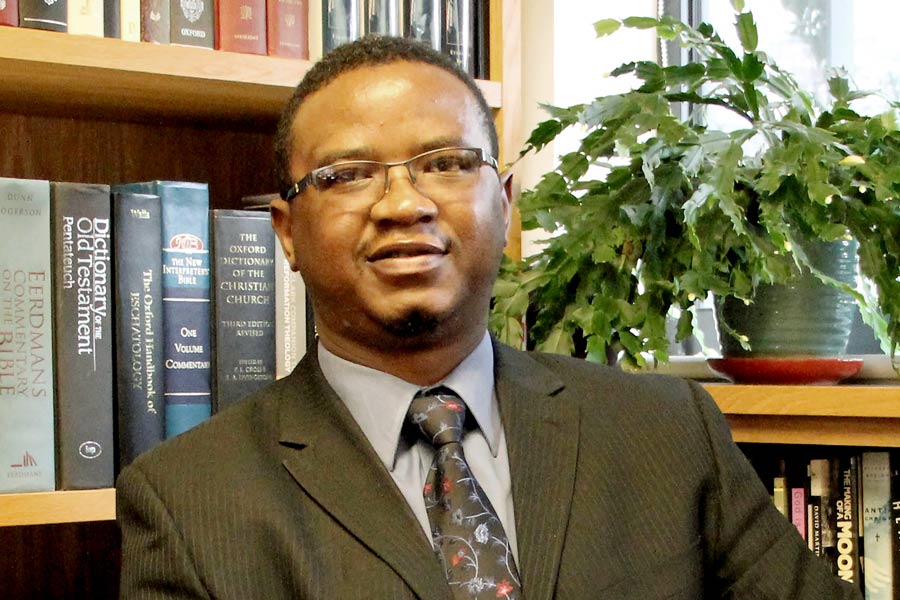Anvil journal of theology and mission
Editorial: The gift of African diaspora churches in the UK | ANVIL vol 37 issue 3
by Harvey Kwiyani and Colin Smith
Christians in Britain prayed for many years for revival, and when it came they did not recognise it because it was black.
Walter Hollenweger1
This latest edition of ANVIL explores the contribution of African diaspora churches to the realities of church and mission in Britain. It is particularly timely for CMS, following on, as it does, from the highly successful launch of an MA programme in African Christianity. It also comes on the heels of Black History Month. Those combined themes of interrogating history and learning from the distinct experience, insights, wisdom and gifts of African Christianity are evident in the articles that follow.
One wonders how Black History Month was marked in theological colleges, programmes and churches up and down the country. Was there a Black Church History Month with a serious exploration and appreciation of gifts of African theologians to the world church, from Clement and Origen to the present day? Where do the pioneers of Black and African Pentecostal churches in Britain figure in considerations of the historical development of contemporary church life in Britain? Is it just possible that there were Christians across Europe and North America who embraced or voiced support for a Black History Month while simultaneously failing to recognise and appreciate the fundamental importance of Black and brown theologians, religious leaders, prophets and martyrs in the history and development of Christianity right up to the present day?
Since the early part of the last century, African Christianity has been profoundly influencing and shaping the landscape of church and mission in Britain. Large-scale migration from Africa into Europe in the past 50 years has been the driving force behind that change. In his case study of the Apostolic Pastoral Congress in Britain, Israel Olofinjana notes the tendency to overlook the sheer diversity of African Christianity in Britain. Such diversity is unsurprising given that contemporary Africa not only has the world’s largest Christian population but also its most diverse. African diaspora churches bring to Britain a diversity in theologies, ecclesiologies, mission and cultures that is often overlooked in favour of more homogenising narratives.
That diversity is also expressed in the intergenerational nature of many African churches. In his article, Joseph Ola explores the experience of African millennials in the diaspora and the ways in which culture and identity shape and influence faith and worship. He considers the way a younger generation of African Christians in Britain face the challenges of a sense of dual identity, but also powerfully points to the importance of younger African Christians retaining an unashamedly African Christian identity, seeing that Africanness as a gift both to themselves and the wider church.
It is this gift of African Christianity to the church in the West that Sheila Akomiah-Conteh points to – identifying the missional contributions of African churches to urban life, drawing particularly on her own doctoral research on churches in Glasgow. She argues that African Christianity is a revitalising force in British Christianity, resacralising the sacred spaces of abandoned church buildings and sacralising urban spaces as churches are planted and develop in what she identifies as secular spaces.
The distinctive gifts and the challenges faced by African Christians in Britain is taken up by Harvey Kwiyani and Paul Ayokunle. Their research into the way health workers from African Pentecostal churches responded to the COVID-19 pandemic offers insights into the ways in which African Christians, their churches and local communities were so deeply affected by it and how they responded to its impact. The article identifies the distinct way in which the pandemic was understood and confronted as both a spiritual and medical battleground. It goes on to explore the theological and existential questions raised by a virus that disproportionately disrupted the community life and worship of African diaspora churches in Britain and served only to emphasise the inequality and discrimination in British society.
The theme of inequality and discrimination is taken up in the video interview with Dupe Adefala, a pastor, church planter, prison chaplain and former student at CMS. The interview explores the research process and some of the findings from her MA dissertation on the legacies of five Nigerian women pioneer ministers in London. Here she seeks to break some of the silence around women’s voices and women’s experience, highlighting a largely untold story of the distinctive and pioneering contribution of African women to mission and church planting in London.
In our other video, entitled If we kept silent the stones would cry out, Gospel artist and praise and worship minister Ahmed Conteh reflects on the way that the distinctive gifts that African Christians bring to church life in Britain is particularly evident in the spirituality and vibrancy of worship and music.
The final article is written by Rosie Hopley, an MA student studying African Christianity with CMS. As the founder and former CEO of a Bristol-based charity, Beloved, she is mindful of the contribution of African diaspora churches to her community, but also aware that so much of that is hidden or overlooked. The inspiration to dig deeper into African Christianity came from the questions of women working in brothels and massage parlours across the city, who asked her, “Isn’t Christianity the white man’s religion?” The quest to respond to that question by unearthing a broader, wider and more global narrative about Christian faith in Britain is illustrated throughout this edition of ANVIL.
About the author

Harvey Kwiyani is a Malawian missiologist and theologian who has lived, worked and studied in Europe and North America for the past 20 years. He has researched African Christianity and African theology for his PhD, and taught African theology at Liverpool Hope University. Harvey is CEO of Global Connections, programme leader for the Africa Christian Diaspora route of the CMS Pioneer MA, and founder and executive director of Missio Africanus, a mission organisation established in 2014 as a learning community focused on releasing the missional potential of African and other minority ethnic Christians living in the UK.

Colin Smith is dean of mission education at Church Mission Society. He teaches on the Pioneer Mission Leadership Training programme and also oversees training for CMS people in mission, including the mission partner pathway. He is author, with Cathy Ross, of Missional Conversations.
More from this issue
Notes
1 Walter J. Hollenweger, “Foreword” to Roswith I. H. Gerloff, A Plea for British Black Theologies: The Black Church Movement in Britain in its transatlantic cultural and theological Interaction with special reference to the Pentecostal Oneness (Apostolic) and Sabbatarian Movements (Frankfurt: Peter Lang., 1992), ix.